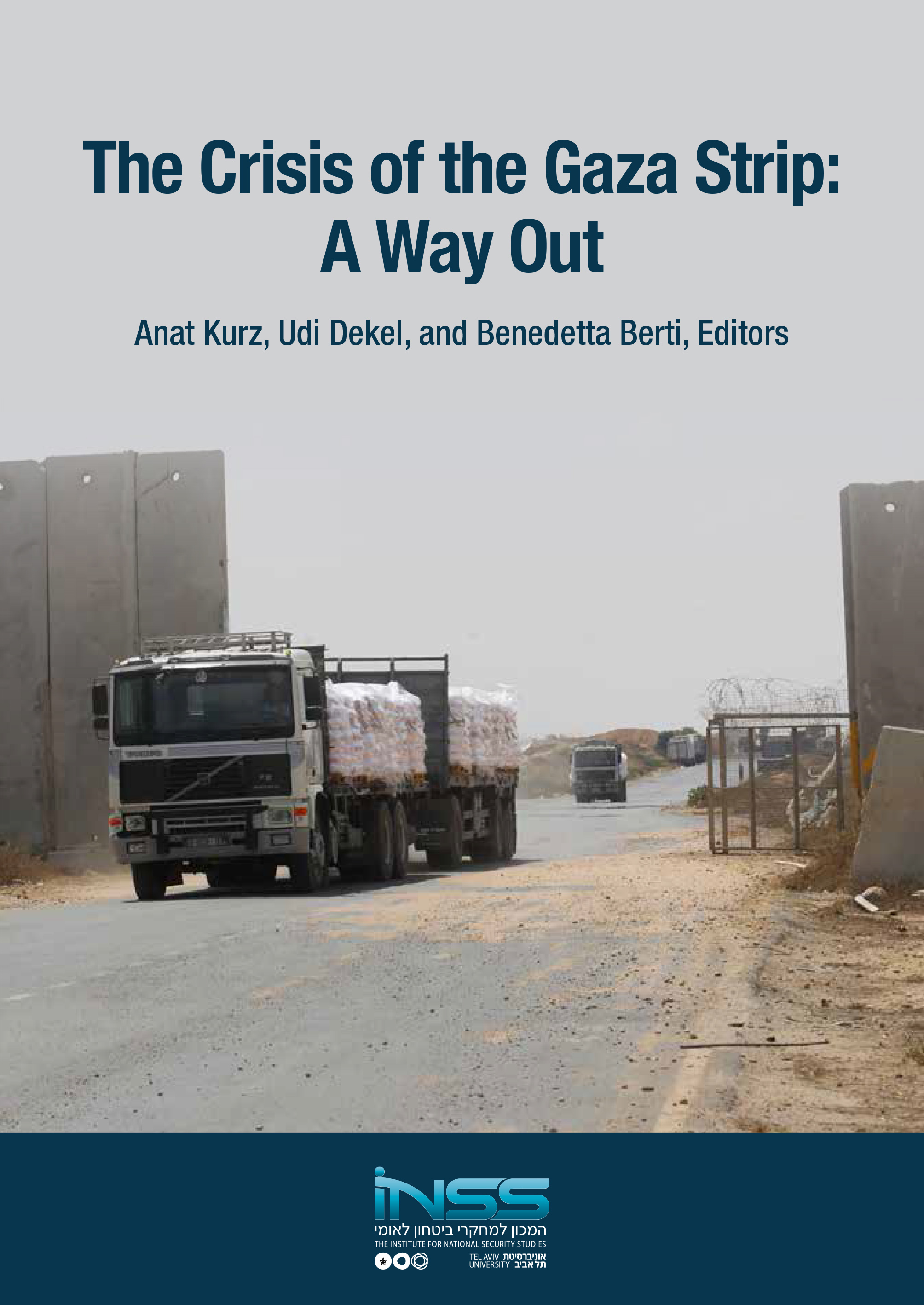Publications
Tel Aviv: Institute for National Security Studies, 2017

In the course of 2017, the Institute for National Security Studies (INSS) conducted a research study to examine the situation in the Gaza Strip, with a focus on the prevailing political, economic, infrastructural, and security conditions, including their cumulative manifestations and their short term and long term implications. The aim of the project was to provide a knowledge base for reevaluation of Israeli policy toward the region and for an international reconstruction project. Underlying this aim is the understanding that the Gaza Strip faces severe and intensifying infrastructure problems, a humanitarian crisis, and security threats.
The articles contained in this volume offer clear conclusions that when taken both individually and together establish that measures to rebuild the Gaza Strip are a critical and urgent imperative. This conclusion was also emphasized in discussions that were part of a workshop held at INSS in cooperation with the Heinrich Böll Foundation, attended by experts who are knowledgeable about the situation in Gaza and representatives of international organizations and NGOs operating in the Strip. Another assessment, shared by many of the authors represented in this volume as well as by the workshop participants, is that the impact of a reconstruction project will only be visible over time. This means that awareness regarding the hardship in the Strip, formal agreement regarding the need to improve the living conditions and infrastructure there, and even the initial mobilization of resources and initiation of processes in this direction will not be enough to prevent a collapse of the Strip’s social and economic infrastructure or to completely prevent the recurrence of a violent clash between Israel and Hamas, which could escalate into an all-out confrontation.
Nonetheless, it is necessary to formulate the outline of a reconstruction project and to take measures, with the aim of increasing over time the chances of mitigating the risk factors originating in the Strip and establishing a period of social and security calm that presumably would enhance the motivation to invest in infrastructure in the region. Notably, the reconciliation agreement between Hamas and Fatah reached in October 2017 may enable states, institutions, and organizations that professed willingness to be part of the reconstruction project to fulfill their participation. The reconstruction project must be carried out with the committed long term involvement of institutions and states in the Middle East and the international community. This will provide it with the broadest possible validity and legitimacy, as well as with the substantial resources that it requires.
The volume’s opening chapter engages in an extensive discussion of the rationale behind the commencement of the Gaza Strip reconstruction project, launched at the initiative of Israel and executed in a coordinated manner with regional and international involvement that is as broad as possible. The chapter also provides details regarding the stages and components of the complex, comprehensive, and resource-intensive reconstruction project, which is necessary to improve the living conditions in the Strip and in turn, to reduce the humanitarian risks and security volatility that are inherent in the current reality.
The volume’s editors are deeply grateful to the authors of the articles, to the Heinrich Böll Foundation, and to the participants in the workshop for their contributions to his project. Special thanks also go to Moshe Grundman, Director of Publications at INSS, and Judith Rosen, the Institute’s editor, for their significant assistance in producing this volume.
Anat Kurz, Udi Dekel, and Benedetta Berti
December 2017
Contents
Strategic Overview –
The Reconstruction of the Gaza Strip: A Critical Imperative
Udi Dekel and Anat Kurz
Questions of Governance Hamas and Governance in Gaza
Benedetta Berti and Anat Kurz
The Palestinian Authority and the Gaza Strip
Shlomo Brom
The Hamas Military Buildup
Kobi Michael and Omer Dostri
Salafi Jihadism in Gaza as Opposition to Hamas Rule
Yoram Schweitzer
The Infrastructure Crisis Human Security and Humanitarian Trends in Gaza: Looking at the Past Decade
Benedetta Berti and Elizabeth Tsurkov
The Water and Energy Crisis in Gaza: Snapshot 2017
Gidon Bromberg, Giulia Giordano, Oded Eran, and Omri Elad
Gaza’s Water and Sanitation Crisis: The Implications for Public Health
Shira Efron, Jordan R. Fischbach, and Giulia Giordano
The Gaza Economy
Alon Rieger and Eran Yashiv
Regional and International Involvement Israeli Policy toward the Gaza Strip
Udi Dekel
A Decade since Hamas’s Takeover of Gaza:The Egyptian Perspective
Ofir Winter and Bar Loopo
Turkey and the Gaza Strip
Gallia Lindenstrauss
Iran’s Policy on the Gaza Strip
Sima Shine and Anna Catran
The Gulf States, Israel, and Hamas
Yoel Guzansky
United States Policy toward the Gaza Strip
Shira Efron and Ilan Goldenberg


